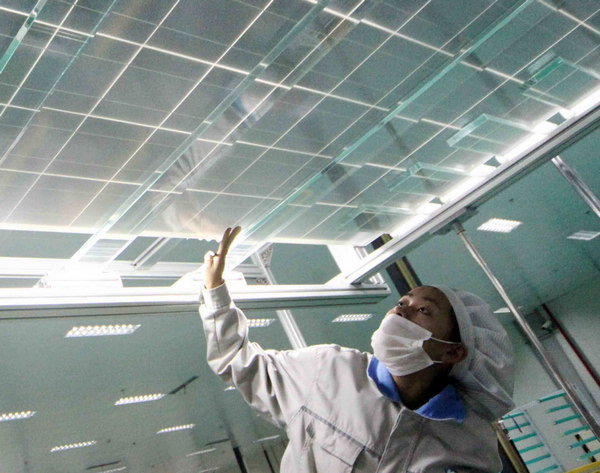 |
|
|
|
|||||||||||
Officials believe investigation will deal huge blow to Chinese exporters
The European Union will probably launch an anti-dumping and anti-subsidy investigation into imports of Chinese photovoltaic solar panels soon, said Li Zhi, director of the Bureau of Fair Trade for Imports & Exports of the Ministry of Commerce.
The possible case comes as domestic manufacturers are already embroiled in an investigation from the United States.
|
 |
|
Workers in Lianyungang city, Jiangsu province, make solar panels for export to the US and Europe. Officials say it's likely the EU will investigate claims against Chinese makers of solar products. Mu Daoyong / China Daily |
"There is a high possibility that the EU will investigate claims that Chinese companies are selling solar cells and modules at unfairly low prices and receiving government subsidies," said Li.
"But we have readied ourselves for the case."
Reports in the foreign media said solar panel makers in Germany are trying to gather support for the EU to launch an investigation against alleged price dumping by their Chinese counterparts in Europe markets.
"The EU has accepted the case, but it hasn't made any decision so far," said Li, referring to the announcement of the investigation.
Although China has sent a delegation to consult with the EU in an attempt to convince the body that Chinese companies haven't been dumping goods in Europe, the EU is highly likely to place the case on file for investigation shortly, she said.
"This is, unfortunately, bad news for the Chinese industry."
Late in 2011, the US Commerce Department announced it was conducting an anti-dumping and anti-subsidy investigation into Chinese solar-panel makers and exporters, responding to a petition by US manufacturers, led by the US arm of SolarWorld AG, one of Germany's largest makers of solar products.
This is also the first such case involving China's clean-energy industry, and those lodging the case have asked for anti-dumping and countervailing duties of more than 100 percent.
Chinese officials have said that the US move is simply trade protectionism.
An EU investigation, if implemented, will deal a huge blow to Chinese manufacturers, said experts.
"If the EU barred Chinese imports the effect would be devastating, especially at a time when the profits of Chinese manufacturers are being squeezed," said Gao Hongling, deputy secretary-general of the China Photovoltaic Industry Alliance. "To be frank, we are not optimistic about the case."
It is estimated more than 80 percent of China's solar cell-related exports go to the European market. In 2010, shipments of Chinese solar panels reached $30.5 billion.
"There are two reasons why the EU has not made any announcement. First, they are still watching the progress of the US case, and second, they are researching and studying how to make a case," said Li.
A preliminary ruling on the US case was originally scheduled for March 2, but has been delayed indefinitely.
"Although accepting and studying the case does not naturally lead to an investigation, the results are unlikely to be positive," Li said.
The European debt crisis and increased competition have resulted in a wave of bankruptcies in the European solar-panel industry.
"They (the US and the EU) are jealous of the rapid progress that China has made in the clean-energy industry," said Liu Hanyuan, chairman of the board of directors of the Sichuan-based Tongwei Group Ltd.
Last year, the private company signed a contract to undertake a photovoltaic solar energy project in the Xinjiang Uygur autonomous region with an investment of 26 billion yuan ($4 billion).
"They are afraid that the newcomer will lead the industry worldwide someday so they planned to start this investigation," said Liu.
European enterprises have received government subsidies to aid research and development in the new-energy sector. Some commentators say those subsidies may have violated World Trade Organization rules.
Since the outbreak of the debt crisis, the eurozone nations led by Germany and Italy have reduced subsidies for the photovoltaic industry. The move has led to a rapid decrease in demand for the products in the region, the largest market for the products worldwide, and has resulted in fiercer competition.
"This (the solar cell case) is only the beginning," Li said.
As the European debt crisis spreads and Chinese companies increase their competitiveness and industrial capacity, they will have to face more trade-remedy cases from the EU in the high-technology and clean-energy sectors, said Li.
On Friday, the European Commission lowered its growth forecast for the eurozone as a whole, predicting the region's economy will probably shrink 0.3 percent in 2012.
The commission also said the region faces a mild recession this year but that the situation could deteriorate further.
"When the economy is fragile, trade frictions come out more easily," said Li.
Du Juan contributed to this story.
You may contact the writers at dingqingfen@chinadaily.com.cn
Wu Ying, iPad, Jeremy Lin, Valentine's Day, Real Name, Whitney Houston, Syria,Iranian issue, Sanyan tourism, Giving birth in Hong Kong, Cadmium spill, housing policy

|

|

|

|

|

|